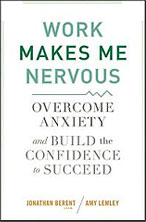Selective Mutism: Continued Words of Wisdom
Being on the clinical front line with selective mutism daily I encounter a tremendous amount of confusion regarding selective mutism. One of the reasons I have created a free cd with excerpts from interviews from 5 families where the problem has been resolve-cured is to create some belief for its’ listeners that there is an answer for this challenging problem.
For parents and caregivers of SM children it is imperative to resolve confusion and skepticism if there is to be a resolution.
It is very interesting that in the last year there has been a substantial amount of media coverage given to this problem. One would think SM is something new. It’s not! My staff and I have been treating it since the early 1980’s. In our free packet of info you can read a story from The New York Daily News in 1991 as well as a story in Long Island Newsday from April 2006. In fact, my book, “Beyond Shyness: How to Conquer Social Anxieties” (Simon & Schuster)was published in 1992.
Often I hear the statement from parents that “SM is genetic”. I respond with “OK; what does this mean to you?” I am often dismayed to hear that “they don’t know”, or that they believe it’s a medical condition which they must learn to accommodate.
It is the process of “accommodation”, which is the result of loving, caring and parental anxiety, which “enables” what I refer to as an “addiction to the avoidance of talking”. I have clearly demonstrated that clinical work which empowers the caregivers’ investment in their SM dependent’s ability vs. disability is the basis of clinical productivity. The reality is that there is a genetic pre-disposition to everything; the color of our eyes, our aptitude, etc. Indeed, a huge percentage of parents of my SM patients have reported that they were “shy” or had “social anxiety”. It is important for parents/caregivers to compensate for the”genetic pre-disposition of SM ”. Productive early intervention can inhibit the development of social phobia, which is already present, as well as, dependent and avoidant personality disorders.
In fact, I challenge any other professional, researcher, or organization to come forth with more demonsratable clinical success!!!
Recently a parent e-mailed me and said “you are an insidious BLEEP for blaming parents; everyone knows this a genetic problem”. This response characterizes insidious confusion. I am not blaming anyone. What I am saying is that parents have tremendous potantial to creative a positive shift if they understand the avoidance-dependence dynamic that so often baffles the psychotherapy and medical communities.
When parents learn how to work together in the development of a parenting strategy I have seen a tremendous amount of success; even through coaching via telephone. Again, I encourage you to listen to the free CD. When parents do not form a team approach success is hard to achieve. Common liabilities include: one parent believing there is a problem while the other does not, the belief that the child will simply outgrow the problem, and overwhelming anxiety on the part of caregivers to invest in any new approach for fear of causing too much stress or anxiety for the dependent.
One of the biggest challenges regarding SM treatment is the integration of school personnel into the treatment system. I have witnessed responses both wonderful and disastrous. Teachers, school psychologists, and guidance counselors often do not understand that SM is usually a very structural problem that will not respond to a simple stimulus-expected response methodology. Often, they do not understand that putting into effect a reward system worsens the problem. I have seen very little initiative on the part of schools to confront this problem, as well a social anxiety in general. One thing I have observed very, very, very clearly; in order to create a productive school response, a parenting methodology must first be in place at home!!
Be wise about the use of pharmaceuticals. They can be very productive if used the right way. If used the wrong way they can worsen the problem. Only after a parenting methodology is in effect; when the child is trying to talk but “paralyzed” should medicine be used. Medicine is a tool to affect a resolution. The purpose of medicine is to create a sense of ease in the brain to help the dependent adjust to the stress of reality and to develop independence skills. The longer term objective is to be medicine- free.


